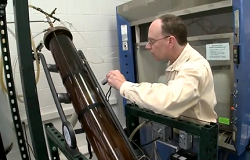 Sen. Chuck Grassley (R-IA) is hoping to avoid a vote in the Senate on the amendment introduced last week by Sen. Tom Coburn (R-OK) that would repeal the Volumetric Ethanol Excise Tax Credit (VEETC).
Sen. Chuck Grassley (R-IA) is hoping to avoid a vote in the Senate on the amendment introduced last week by Sen. Tom Coburn (R-OK) that would repeal the Volumetric Ethanol Excise Tax Credit (VEETC).
Grassley said today during his weekly agricultural media conference call that there are two ways the vote can be avoided. “Either talking him out of it, or denying unanimous consent to bring it up, and I think we can do the latter,” he said. Grassley say he is trying to “reason with” Coburn and urge him to take up the issue within the context of energy legislation so to “have ethanol be viewed as part of an overall energy program” instead of having it be part of the spending bill debate.
According to Grassley, Coburn says he has 55 votes. “He probably needs 60 votes. I think we can probably keep him from getting 60 votes. But, quite frankly, I don’t want anybody on record, if we can avoid it, on the ethanol issue until we get down to discussing it as part of the energy debate.”
Listen to Grassley’s comments in answer to a question by Dan Looker of Successful Farming. Sen. Grassley
Meanwhile, as the future of the VEETC remains unsure in Congress, ethanol interests are reportedly in negotiations on a proposal for moving beyond the VEETC. According to DTN/The Progressive Farmer, representatives from the American Coalition for Ethanol, Growth Energy, National Corn Growers Association and Renewable Fuels Association have been working on a compromise proposal this week, getting input from lawmakers in Washington.



 Biotech firm
Biotech firm 


 PGI, a technology development company, has been testing their propriatary Corn Oil and Protein Extraction (COPE) process at GTL’s 110 million gallon ethanol plant located near Rochelle, IL. GTL, in concert with their ethanol subsidiary Illinois River Energy, provides the space, utilities, and feedstock to extract zein protein from corn. In 2009 GTL and PGI constructed a 2400 sq. ft. pilot plant on GTL’s ethanol plant site. The objective of the pilot plant project was to demonstrate the efficient extraction and purification of soluble zein protein from the corn kernel, prior to fermentation. The pilot trials have also provided zein samples for market development activities with customers.
PGI, a technology development company, has been testing their propriatary Corn Oil and Protein Extraction (COPE) process at GTL’s 110 million gallon ethanol plant located near Rochelle, IL. GTL, in concert with their ethanol subsidiary Illinois River Energy, provides the space, utilities, and feedstock to extract zein protein from corn. In 2009 GTL and PGI constructed a 2400 sq. ft. pilot plant on GTL’s ethanol plant site. The objective of the pilot plant project was to demonstrate the efficient extraction and purification of soluble zein protein from the corn kernel, prior to fermentation. The pilot trials have also provided zein samples for market development activities with customers.


 During his visit, Obama and Brazil’s President Dilma Rousseff agreed to launch a Strategic Energy Dialogue, to focus on both oil and biofuels. “Now even as we focus on oil in the near term, we shouldn’t lose sight of the fact that the only long-term solution to the world’s dependence on fossil fuels is clean energy technology,” Obama said in his
During his visit, Obama and Brazil’s President Dilma Rousseff agreed to launch a Strategic Energy Dialogue, to focus on both oil and biofuels. “Now even as we focus on oil in the near term, we shouldn’t lose sight of the fact that the only long-term solution to the world’s dependence on fossil fuels is clean energy technology,” Obama said in his 